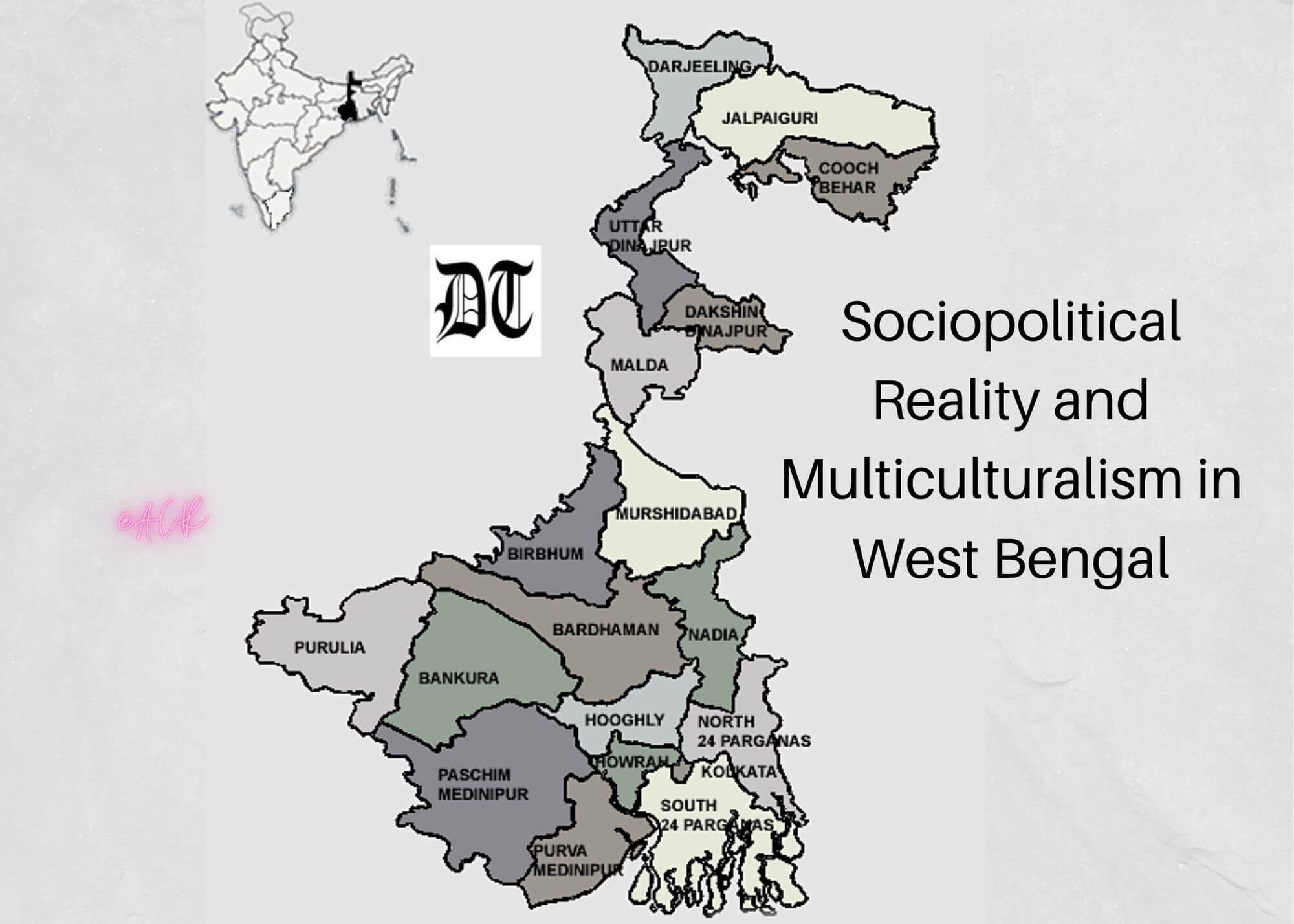Reading Time: 5 minutes
Despite tall claims of the BJP of winning the polls in West Bengal, much before it was over, the poll results proved that people’s mandate was against it. Prof Laksmisree analyses the sociopolitical reality and multiculturalism in the eastern state, in the historical context, exclusively for Different Truths.
In the past two odd months, I have been trying my best to introspect through the bleak, grim scenario and delve deep into the heart of the matter, now suddenly in the sunshine of the landslide victory of my home state Bengal against the BJP juggernaut. The recent assembly elections in five states with endless election rallies, rounds of voting and religious festivals like Kumbh Mela with mammoth crowds swelling in the wake of the monstrous second Covid surge transforming India into a huge cremation ground, seemed like an incredible phantasmagoria.
Most Indians struggled to locate their identity/existence in a bizarre atmosphere of scrambling for life…
With TV Channels hungry for TRPs, swiveling between reports of lakhs of death or of those waiting to die without oxygen or hospital beds and the daily voting/ election reportage, left most of us exhausted in the grip of extreme fear, unknown hitherto in India. Most Indians struggled to locate their identity/existence in a bizarre atmosphere of scrambling for life against the reported grilling authoritarian political machine.
Suddenly, a whiff of fresh, fragrant air puffed in through the windows as the election results were declared. Many people congratulated each other for all the winning states as a herald of positive change in our country, led by Bengal, as they said, in its political success.
It almost seemed as if she was leading a countrywide battle in Bengal against autocracy in an overwhelming dance of democracy…
Of course, I was happy as a Bengali Indian woman in being witness to a rough and tough female Chief Minister of Bengal, totally belligerent and unyielding to the ‘outsider forces’ trying their best to defeat her. She fought tooth and nail like our historical Jhansi ka Rani finally remaining unvanquished with a convincing victory against the alleged communalist brigade. It almost seemed as if she was leading a countrywide battle in Bengal against autocracy in an overwhelming dance of democracy, setting a glorious example for all Indian states to follow her in this round, almost like the fall of the Trump administration, when the ordinary Americans fought fiercely and won, in their extraordinary quest for democratic governance.
Hold on please – in this euphoria, I suddenly received a congratulatory note from an academic friend, who posted an illustration of our proud ‘Bengal Brigade’ marching ahead, with a quote from Viceroy Elgin written, in 1897, about the Bengali people, which made me feel proud, with a certain analytical perceptivity. He wrote in a report to London: “Bengalis are a peculiar people. They don’t often believe what we tell them. They can critically think and, based on knowledge, are fiercely opinionated. Almost too progressive. It is not a problem we have encountered anywhere else in India”. One has to note happily that though coming from the stance of Imperialists, or as one may say from high-handed domineering rulers, three significant characteristics of the Bengali people emerge from Lord Elgin’s anomalous comment, which must have contributed to Bengal’s recent electoral victory : (i) ability of critical thought, (ii) judgement based on knowledge equivalent to practical experience and (iii) their doggedness never to be fooled or succumb to the deceit often practiced even now by the Indian rulers of today.
So, this makes me tempted to quote that famous saying, “What Bengal thinks today, India thinks tomorrow”, a quality which perhaps may contribute, soon, to the forward march of India while rebuilding its tattered democracy in order to reach new heights of a new age with Bengal leading from the front.
To understand this pluralistic wisdom, knowledge, and interconnectivity one has to delve a little more into the history and cultural legacy of Bengal…
This may not be misconstrued as any narrow provincialism but an attempt to focus on the innately true nature of Bengal, which in the most unbiased manner, so splendidly fits into the larger framework of Indianness and the universalised global world of today. To understand this pluralistic wisdom, knowledge, and interconnectivity one has to delve a little more into the history and cultural legacy of Bengal, which has seeped deeply into its racial fabric, across the spectrum.
Calcutta was the capital of British India, in which the knowledgeable upper and middle classes easily learnt to be cosmopolitan and eclectic in both their thoughts and actions, while imbibing the foreign colonial culture and simultaneously incorporating it into their own Indian traditionalism. This brilliant amalgamation of the Orient and Occident also facilitated their easy assimilation of anything alien and also their practice of social and religious harmony. Bengalis in their smooth pluralism and co-existence with different faiths and ethnicities would also keep trusted household staff from these variegated groups of the community, till this multiculturalism filtered downwards to the common people on the street, who were also geared to think critically, act openly, debate fiercely but logically and also open their hearts and homes to one and all. Fanaticism, discrimination, xenophobia, jingoism and ultra-protectionism were qualities which could hardly infiltrate the concordant social fabric of Bengal, at varied points of time, when it always followed the progressive path exemplary to the rest of India.
Most families then were strangely both Indian and Western in their value-systems…
This racial consciousness and genetics of Bengali multiculturalism evinced not just open arms and minds but a judgemental, critical thinking process as well, for not surrendering to the dark shades of the intruding Colonisers when they tried to be suppressive. Most families then were strangely both Indian and Western in their value-systems and also selective in their assimilation for sifting and filtering out the best of both the cultures. Hence if we look at the top-level social reformers of Bengal like Raja Ram Mohan Roy, Rabindranath Tagore, and many others from the Bengali Brahmo Samaj, they were deeply educated and knowledgeable in both the Indian and European classical texts to form their composite logical thinking. The social evils of India like Sati-dahan, oppression of widows, etc. were abolished through legislation in total alliance with the British Colonial rulers.
Yet, these same wise, eclectic, secular, and all-embracing people of Bengal, became the most fiery and virulent Bengal revolutionaries like Subhas Chandra Bose, Rashbehari Bose, Aurobindo Ghosh and many such, who rebelled fiercely against the British Imperialists when their critical minds were deeply assaulted by the divide and rule despotic policies of the Raj. Hence, when Netaji Subhas Bose formed his first Indian National Army (INA), most of the Indian Defence Forces joined him or delved deep into insurgency, being ignited by Netaji’s call for Indian Independence. The ultimate battle-cries from many Bengalis who followed Netaji historically and truthfully made the Britishers flee from India in sheer panic.
The Bengali mind is as free as it is dogged against the evils of ugly bigotry and authoritarianism engulfing contemporary India.
Finally, these traits of deep wisdom and judgement, multiculturalism and humanity, liberalism with patriotic fervour for the freedom of India from all shackles of dogma, hatred, and divisiveness, across the social spectra of Bengal, are the definitive reasons for the present victory of Bengal. The Bengali mind is as free as it is dogged against the evils of ugly bigotry and authoritarianism engulfing contemporary India. As the Covid surges to kill our millions of dear Indians in the grip of both disease and a grueling, collapsed political system, we believe that the time has come for us to read just three texts of Tagore for both Bengal and India to recover and rejuvenate to our second Independence. These are The Religion of Man, Nationalism (which is not the ultra- jingoism being practiced today by the political dispensation) and his famous poem Bharat Tirtha, a laudatory poem of India as the melting pot and pilgrim- point of a vast Sea of Humanity comprising infinite races, classes, cultures, faiths, and languages breathing and embraced here in India, through the ages.
Tagore’s famous sonnet, “Where the mind is without fear and the head is held high / Where knowledge is free…” decrying the fragmentation of “narrow domestic walls” and the desiccation of obsolete rigid traditions “in the dreary desert sand of dead habits” encapsulates all of it. This remains the ultimate trumpeting cry of Bengal as the harbinger of a new way of life and freedom – an expansive freedom of the mind, which has permeated the Bengali, Indian as well as global consciousness only through the timeless mentorship of our Gurudev Rabindranath Tagore.
Visual by Different Truths


















Only Bengal and Didi have stood upto the bullyism of the Centre. There is a gope for future. I wonder Punjab and WB have to wage the struggle for freedom once again. Tagore’s lines 8nspire a great vision of India which stands tarnished today. India is a Museum of Democracy only. Your articke is timely and scathing and upholds the vskues of liberalism and freedom in the dace if erosive and corrosive politics.